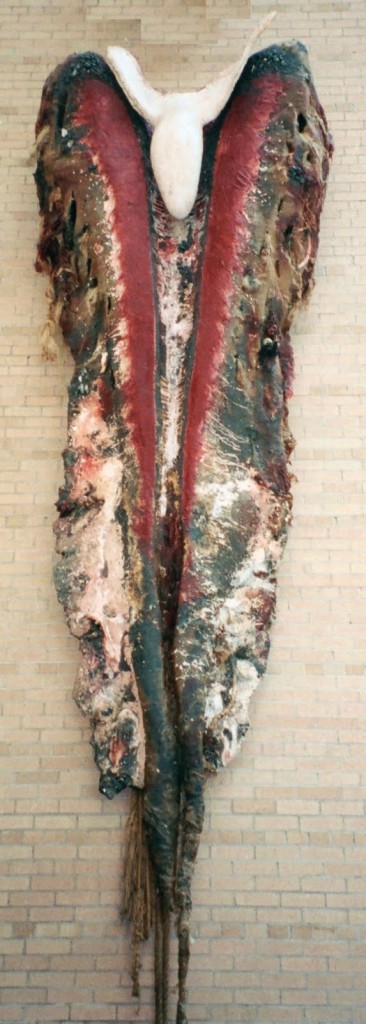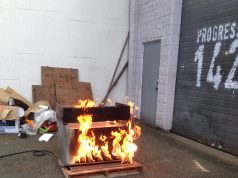Amy: Hi Matthew. Happy New Year! Happy new chat!
Matthew: HNY
Laakkuluk entered the room.
Amy: Oh goodie, Laakkuluk!
Laakkuluk: WHOOOOA! I made it! Hello everyone!
Laakkuluk: Sorry about my Internet issues. Northwestel – the bane of our existence in Iqaluit these days
Matthew: Northwestel was just getting you ready to chat about barriers
Amy: Who wants to start?
Laakkuluk: it’s a difficult question!
Matthew: Depends on the situation. If one is talking generally then there are few barriers. Talking to an individual about their work requires some decency.
Amy: First of all, I cannot really comment on theatre in Canada because I see so very little of it.
Laakkuluk: I feel the same – I’m in a bubble of theatre here in Inuit lands

Amy: I can comment on theatre in Newfoundland. I think for me when it comes right down to it, empathy. Because I feel empathy for artists and their work. If I do not particularly like something it does not mean it is not worthy. There is always a backstory behind art. I know it is meant to be interpreted, but my interpretation may not be at all what the artist was going for, or why he/she did the work. The photo I sent was of a very controversial sculpture that used to hang in our Government Bldg, but was taken down because of some people’s interpretation! I sent a link to a story about it as well.
[http://www.thetelegram.com/Blog-Article/b/22961/Red-Trench-Redux]
Matthew: I read the link- interesting story. Seems like a lot of people have expressed opinions about that work over the years. Somehow by being controversial, the piece made it easy for people to give opinions- especially poor opinions of the work and artist
Laakkuluk: Sometimes the common denominator in controversy is the ease in making derogatory remarks; look at any newspaper comment section.
Matthew: This subject made me think of the peer review process. That seems a place where opinions are expressed pretty freely and professionally. There are peers at the table, providing a professional atmosphere to the dialogue. The opinions are generally frank as there is a competition going on.
Amy: However, I have gotten results of reviews from our Arts council assessment jury and it has hurt my feelings. You cannot help but take it personally.
Matthew: Of course. And there is only dialogue amongst the advisory. The applicant does not get to dialogue with the assessors.
Laakkuluk: I do like the peer review process in academia – it’s been really helpful for me. Strangely enough that’s anonymous
Amy: It all comes down to opinion does it not?
Matthew: Yes, but to a degree subjectivity is kept to a minimum by the multiple peers on the advisory
Amy: One lives in hope! 🙂
Matthew: What stops me from expressing my opinions about the state of Canadian theatre is when I speak to an individual about their work, as was mentioned previously. If I know the artist I can express an opinion better. And if they seem receptive. The moment is important too; immediately following the show is not always best.
Laakkuluk: yes – after the show, everyone needs a period to float back down again
Amy: Good point. Time makes us all a little more objective.
Laakkuluk: Well – in some ways, my answer is really easy: our barrier here is that we don’t even have a theatre to comment on though there is a goodly amount of theatrical work.
Matthew: So when I ask you what do you think of the state of Canadian Theatre, your answer is no comment?
Laakkuluk: no
Matthew: OK, WDYTOTSOCT?
Laakkuluk: It would be that a major barrier to us having a vibrant theatre community to comment on is actually having physical space to make professional theatre
Matthew: I see that
Amy: Matthew, do you feel you know the state of theatre in Canada? Or have an opinion about?
Matthew: Well, as Laakkuluk’s answer indicates, we all give a regional or subjective opinion.
Laakkuluk: I think that one of the things that we’ve proved in our previous conversations is that we don’t know what Canada is, except that it’s the “middle bits”
Amy: The little middle bittles!
Laakkuluk: but that through our interconnectedness, we can cast a web of Canadaness
Matthew: From my perspective, I see a lot of stories and shows lately that are about the individual or from the individual perspective. So, for example- Winners and Losers and A Brimful of Asha. Both very different works, both from a supposedly very personal perspective. I saw a lot of work like that in the past year, so for me the state of CT right now is we’re all navel gazing a bit. That’s not meant to be a slight. It’s just what seems to be happening. And it is just my perspective.
Laakkuluk: that’s interesting. [That] follows the popular culture of individualism in Canada
Matthew: I know I am doing some of that with projects I am working on
Amy: how so, not knowing the shows I do not understand
Matthew: Well, instead of writing a well made play- three or five acts fiction, we’re writing and performing memoir or diary
Amy: Ah, interesting. Navel gazing!
Matthew: The work that seems to be succeeding at this is the highly personal universal tale.
Laakkuluk: It reminds of the struggle that some Inuit performers have with the concept of celebrity. Many Inuit performers work in a collaborative manner. For example throat singing is traditionally done in pairs and many people have made collaborative theatre projects – not one director, writer, actor but the Canadian media picks up on charismatic individuals to champion that work; sometimes for the right reasons, sometimes for the wrong reasons
Matthew: celebrity as a barrier
Laakkuluk: I suppose that means I’m saying that cultural differences in communication are a barrier
Matthew: ah
Amy: yes
Laakkuluk: and I suppose celebrity could be a barrier too, but I’m not sure of that
Amy: That is blowing my mind. I can not get my head around that . Celebrity comment.
Laakkuluk: also a lot of our young performers are eager to get celebrity status right now and it means that they don’t always get to hone their craft before they are out there
Amy: Ok, it’s clearer now. I see what you mean. Interesting. This community always found their legs in Theatre and then graduated, if you will, to film. But now, the young people seem to go right for film first! The thought is there is more $ in film. I believe.
Matthew: Now that we’ve had six chats together, perhaps we’ll be better at expressing our opinions of one another’s work when we finally have the chance to see each other’s work!
Laakkuluk: I can’t wait to see each other’s work. 🙂










